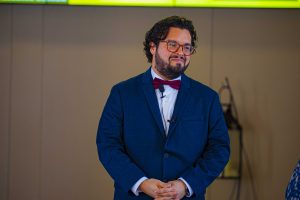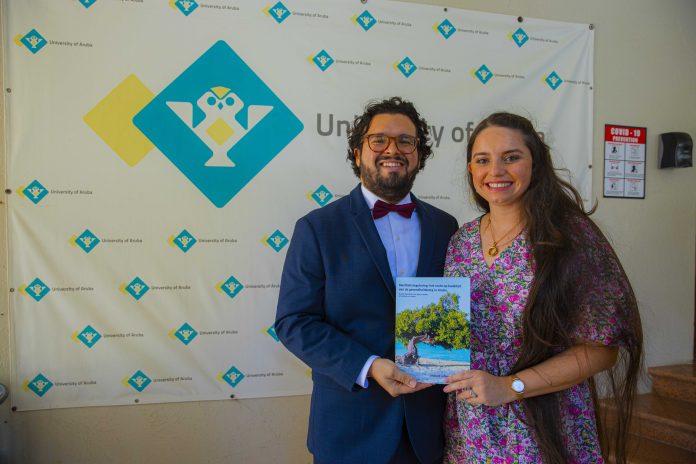It is necessary to create a completely new system to assure that Aruba can comply with international agreements on the health care quality rights. That is the conclusion of Dr. Jayburtt Dijkhoff, who was granted the title Doctor of Law, after defending his thesis in front of the university committee existing of members from University Utrecht and University Groningen (ProfessorDr. J. Sijmons and ProfessorDr. J. Hubben) in the Netherlands, as well as the University of Aruba.
The research on doctoral level is titled “Regulation of quality: the right of quality health care on Aruba.” This research focused on whether Aruba is meeting its obligation to ensure the quality of health care within its own laws, and if not, what proposals can be made to improve this. “In general, quality regulation must be made coherent through a coherent vision of health care quality.”
Working with the Public Health Department
Dijhoff explains that after finishing his study of law at the University of Aruba, he has been driven to do a research. The opportunity presented itself in 2012, when he became a legal consultant in the Department of Public Health. As gained experience in the different aspects of public health care, he collaborated in introducing two new laws: “Professions of Health Care” and “Quality of Public Health Care.” After implementation of both laws, the general opinion was divided leading to more pressure on the Aruban government. The government requested more insight on the quality of service at the hospital and therefore invited Dijkhoff to discuss this matter. This was when Dijkhoff met Professor Dr. Hubben, a practical and experienced person whom he approached to be his promoter. “Professions of Health Care” and “Quality of Public Health Care” were long expected laws with the hope that a change would occur in the island’s health care quality.
The right to high quality health care
Following the standard procedure to achieve a doctoral, Dijkhoff’s road to graduation was not without obstacles. He faced the challenges of balancing work, study and family. “It was a wonderful experience, where I learned a lot especially that good or bad quality leads to good or bad costum, and eventually to good or bad results.” His promotional research contains 400 pages and points out that Aruba has the responsibility to regulate the public health care system, an essential part of the right to quality health care.
This has resulted in reformed laws of quality health care in 2014, based on the quality regulation of the Netherlands. The result were the two former mentioned new laws: Professions in health care” and “Quality of public health care”. However the impact of both laws was not evaluated up to now. The right to quality health care is drawn in international treaties but it depends on each country’s national laws whether they participate in these treaties. First one needs to determine what defines quality health care.
Is Aruba complying with its responsibility?
The main question in Dijkhoff’s research is if Aruba is meeting its obligation to ensure the quality of health care within our own laws, and if not, what proposals can be made to improve this. The conclusion is that the island is not complying this obligation.
Aruba’s formal and informal regulation is insufficiently developed to comply with the obligation of right to quality health care. All laws steering health care are based on own regulation and turn out to be insufficiently working. In reality, the laws are outdated or incompletely implemented which carries the consequences of failing integration in their area. “Aruba’s laws are not functioning well and in practice are based on Dutch guidelines.”
Aruba is falling behind
Dijkhoff analyzed the laws of health care quality and compared them with the Dutch laws to determine if Aruba is meeting the requirements of the right to quality health care. In the Netherlands, these laws are without embargo not centralized and therefore it is necessary to follow the five steps of development, drawn up by Professor Dr. Sijmons. After studying the Dutch laws, Dijkhoff could conclude that Aruba is falling behind in the regulation on quality health care. The different laws that determine the required quality show that the government is unable to revise these laws individually. It needed to revise the system to harmonize each law and better regulations. Aruba has made an effort to lay a foundation with the introduction of the two new laws, but both are insufficient because of incomplete implementation and insufficient harmony. The lack of own regulation is another obstacle for optimal function of all health care laws on the island. If we look at the Netherlands we can see that quality regulations are based on own laws and this is functioning well.

In need of a fresh approach
Considering that Aruba is not complying with its obligations, Dijkhoff formulated proposals to better this situation. The most important one is the introduction of a complete new systematic approach. He recommends to revise each separate law on quality of health care. Secondly, Aruba needs to comply with article 2 in the European Convention of Human Rights elaborating on the right to life. The introduction of a legal amendment to assure the right to independent and impartial investigations in the case of death of a patient under the responsibility of health care. The Funeral Law and Death Declaration Law must not oblige a doctor to determine the cause of death at the moment of death determination.
Dedicated to his father
The evaluation commission consisted of Dr. A. Brenninkmeijer (University of Utrecht), Dr. Huisman (Universityof Utrecht), and Dr. H. Bröring (University of Groningen, Dr. F. Koenraadt (University of Curacao) and Glenn Thode, rector of the University of Aruba. Others who supported this thesis were Dr. CeesHamelink, Dr. Glenn Sankatsing and Dr. Viola van Bogaert. Dijkhoff thanked the collaboration of Aruba’s court house and all people who contributed to the research and thesis. A special word of thanks went to his family, particularly to his wife. The graduation is dedicated to his father who stimulated and guided his son to his final achievement.

















